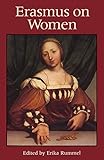Erasmus on Women / ed. by Erika Rummel.
Material type: TextPublisher: Toronto : University of Toronto Press, [1996]Copyright date: ©1996Description: 1 online resource (251 p.)Content type:
TextPublisher: Toronto : University of Toronto Press, [1996]Copyright date: ©1996Description: 1 online resource (251 p.)Content type: - 9780802078087
- 9781442674561
- 305.4 21
- B785.E62
- online - DeGruyter
| Item type | Current library | Call number | URL | Status | Notes | Barcode | |
|---|---|---|---|---|---|---|---|
 eBook
eBook
|
Biblioteca "Angelicum" Pont. Univ. S.Tommaso d'Aquino Nuvola online | online - DeGruyter (Browse shelf(Opens below)) | Online access | Not for loan (Accesso limitato) | Accesso per gli utenti autorizzati / Access for authorized users | (dgr)9781442674561 |
Browsing Biblioteca "Angelicum" Pont. Univ. S.Tommaso d'Aquino shelves, Shelving location: Nuvola online Close shelf browser (Hides shelf browser)

|

|

|

|

|

|

|
||
| online - DeGruyter Erasmus' Annotations on the New Testament : From Philologist to Theologian / | online - DeGruyter Erasmus as a Translator of the Classics / | online - DeGruyter Erasmus in the Twentieth Century : Interpretations 1920-2000 / | online - DeGruyter Erasmus on Women / | online - DeGruyter Erasmus : His Life, Works, and Influence / | online - DeGruyter Ernest Lapointe and Quebec's Influence on Canada's Foreign Policy / | online - DeGruyter Ernest Lapointe : Mackenzie King's Great Quebec Lieutenant / |
restricted access online access with authorization star
http://purl.org/coar/access_right/c_16ec
In his writings Erasmus was more interested in arguing than in settling a case. However the equivocation we find in his writings is more than a literary game or a technical expedient. It is the corollary of his scepticism. One can hardly expect unequivocal statements on complex issues such as the role of women in society from a man who holds that `human affairs take so many shapes that definite answers cannot be provided for them all.' But as Erika Rummel demonstrates, the difficulties of interpreting Erasmus' texts do not invalidate their use as sources of social history; they only prevent us from ascribing the views expressed specifically to Erasmus. What emerges from the text is a composite picture of women's role in society, reflecting a spectrum of views held in Erasmus' time rather than a coherent set of views advocated by him personally.Erasmus on Women offers selections from Erasmus' manuals on marriage and widowhood, his rhetorical treatises, and the Colloquies. The texts deal with the courtship, marriage, child-rearing, and widowhood. Selections treating particular topics, such as prostitution, scholarship, and activism, are placed within the context in which they are discussed by Erasmus.Erasmus' dialogues present a lively cast of virgins and mothers, housewives and harlots, shrews and activists. The fifteen texts and excerpts offered here represent a mixture of traditional and progressive thought. Along the traditional lines, he commends women for their role as caregivers and for their service to God and society. In contrast, he holds progressive views (by the standards of his time) on the education of women and breaks with tradition by challenging the idea that celibacy is superior to the married state.Erasmus' views were radical for his time and frequently involved him in controversy. Lavishly praised by some, his writings were bitterly denounced by others. Yet the wide dissemination of his writings makes him an important commentator and influence on the social thought of the sixteenth century.
Mode of access: Internet via World Wide Web.
In English.
Description based on online resource; title from PDF title page (publisher's Web site, viewed 01. Nov 2023)


